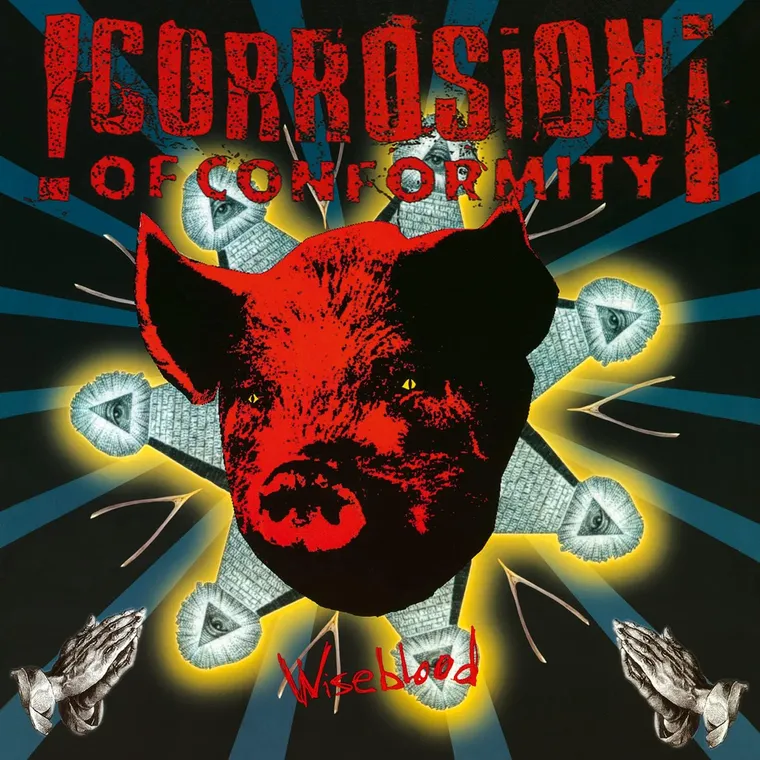Released on October 15, 1996, Corrosion of Conformity’s Wiseblood didn’t just flirt with Southern sludge and heavy metal swagger — it grabbed them both by the throat and dragged them through a cloud of cigarette smoke and amplifier fuzz.
At a time when metal was splintering into extremes — nu-metal rising, groove metal fading, and grunge’s ashes still warm — Wiseblood planted its flag somewhere in between: equal parts Sabbath stomp, Lynyrd Skynyrd soul, and Motorhead menace.
If Deliverance was COC’s breakthrough, Wiseblood was their exclamation point — a record that leaned harder into the riffs, the groove, and the grit. It’s the sound of a band doubling down on what made them different: the ability to sound massive without losing their punk heart.
This wasn’t a shift. It was a statement.
Between Dopesick and Dixie: A Band With Dirt in Its Blood
By the time Wiseblood dropped, Corrosion of Conformity had already shed their hardcore skin. The transformation began with Blind, but it was Deliverance that fully embraced the band’s newfound love for classic rock, doom, and the southern-fried blues lurking behind the distortion.
But Wiseblood? This is where that sound bloomed — or more accurately, rotted into something beautiful.
The production is dense and meaty. Pepper Keenan’s vocals are more confident, his drawl soaked in bourbon and burned sermons. The riffs? Slower, thicker, meaner. You don’t just hear them — you wade through them.
And while the band is clearly paying homage to their influences — Sabbath, ZZ Top, Skynyrd — it never feels derivative. This is Southern metal with its own voice. Gritty, groovy, and deeply human.
Baptized in Mud: Songs That Bleed and Burn
The album kicks off with “King of the Rotten,” a swaggering gut-punch that sets the tone immediately — down-tuned guitars, barked vocals, and a groove so heavy it leaves tire tracks.
But the real monster? “Wiseblood.” The title track isn’t just the album’s centerpiece — it’s a mission statement. With its lurching tempo, swampy tone, and an absolutely feral vocal performance, it oozes menace and charisma. It’s metal that remembers how to swing, how to breathe, and how to mean it.
Then there’s “Born Again for the Last Time,” which straddles a line between introspection and annihilation. There’s a tragic beauty here, buried under layers of fuzz and feedback — a theme that runs throughout the record.
Even when the tempo picks up — like on the punk-thrasher “Fuel” or the galloping “Wishbone (Some Tomorrow)” — the band never loses its sense of weight. Every snare hit feels like it’s digging a deeper grave. Every solo howls like it's echoing off rusted church walls.
“Redemption City” is a slow-burning, almost bluesy descent into decay and regret. It doesn’t come out swinging; it simmers, smoldering under the weight of its own despair. The riffs are soaked in southern sorrow, the vocals sound like confessions barked from a pulpit on fire, and the whole thing feels like it was written at the edge of a ghost town at dusk. It’s one of the album’s most haunting moments — not because it’s the heaviest, but because it’s the most honest.
And let’s not ignore “Man or Ash,” which features Metallica's James Hetfield on backing vocals, the song is akin to a funeral procession — slow, solemn, and smoldering with existential dread. It’s the kind of track that doesn’t end so much as fade into the soil.
Sabbath in the South: The Power of Groove and Grime
What makes Wiseblood so effective is that it moves. This isn’t about technical prowess or relentless aggression — it’s about feel. The riffs breathe. The drums swing. There’s room for silence, for space, for the notes that don’t get played.
Pepper Keenan shines here — not just as a vocalist, but as a storyteller. There’s a world-weariness in his delivery that makes every line sound lived-in, whether he’s howling in fury or muttering through the smoke.
Woody Weatherman’s guitar work is masterful in its restraint. He knows exactly when to let a note ring, when to choke a riff, and when to let things fall apart just enough to feel human. This isn’t surgical precision. It’s swampy, soulful, and alive.
And the rhythm section? Mike Dean and Reed Mullin (RIP) lay down a foundation so solid it feels prehistoric. The bass rumbles. The drums groove. There’s a chemistry here that can’t be faked — the sound of musicians who know how to trust each other and play for the song, not their egos.
Production: Thick as Smoke, Heavy as Guilt
This album sounds like it was recorded in a church built from whiskey barrels and Marshall stacks. It’s thick — not muddy, not overly compressed — just dense. Every instrument feels present. The mix is warm and organic, and that analog edge gives it serious weight.
There’s a vintage tone throughout, but it’s not nostalgic. It’s timeless. The guitars are crusty but clear. The drums hit like fists on a wooden door. And the vocals? They sound like they’re coming from someone you’d believe in a bar fight or a backwoods sermon.
Final Verdict: 9/ 10
Wiseblood is more than just a great Corrosion of Conformity record. It’s a masterclass in how to evolve without selling out, how to channel your roots without being stuck in them. It’s Southern metal with a soul — heavy, honest, and unapologetically dirty.
This isn’t an album that screams for attention. It broods. It swaggers. It waits for you to come to it. And once you do, it stays with you — like smoke on your clothes, like a bruise you forgot how you got.
For longtime fans, it’s a high point. For newcomers, it’s a baptism by fire and feedback. Wiseblood doesn’t just hold up — it sounds better now, in an era where too much metal forgets how to feel.
This is music with guts. With grime. With gravity.
And damn, it still grooves.

